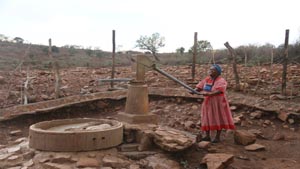Food stockpiles are dwindling. Even if the rains come now, new crops will not be planted until October for summer harvest.
Only a quarter of the funds needed to purchase food for an estimated 638,000 people who will be in need by the year’s end are available, reports the National Disaster Management Agency (NDMA). When drought was declared a national emergency in February, donor organisations and private entities pledged assistance.
“We received pledges amounting to R97,740,000 but we have only received R24,800,000 which is only 25 % of the needed amount,” NDMA CEO Russell Dlamini told a press briefing.
This year, production of maize, the Swazi staple food, was down 60 % from 2015. To date, 67,000 cattle, which are cherished for their cultural value by Swazis, have perished as water sources evaporated and grazing land was decimated.
With the end of El Niño weather conditions that severely reduced precipitation this year, normal rainfall was expected to return to Swaziland in October, predicted the National Meteorological Department.
Based on this forecast, the NDMA has urged Swazi farmers to plough fields when the first rains arrive. However, the Ministry of Agriculture has informed parliament that only 400 government tractors exist in the entire country for rental by farmers.
Two-thirds of Swazis live on communal Swazi Nation Land without title deeds to their land, which disqualified them from obtaining bank loans. These subsistence farmers depend on government tractors to plough their fields.
In the absence of machines, farmers must resort to traditional methods of hand-ploughing with hoes or oxen. The reduction of cattle herds by the drought has lessened the availability of healthy oxen for the work.
The NDMA reports that its new policy of paying R550 cash to drought-affected households has in some cases worsened the food shortage. Some beneficiaries saw the monthly payments as gifts unrelated to food aid. Rather than purchasing food, they awaited food parcels that had been previously distributed but had been replaced with cash stipends.
--ANA--











